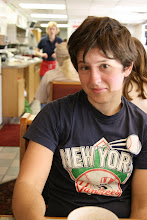 Last night I furiously pedaled to The Lexington Club at 8:50pm when I realized that it was the premiere night of the sixth and final season of the L Word. Briefly, I thought about my friends in Portland who were probably getting ready to watch the same thing and how the scene at the Lexington only pales in comparison to the Sunday night networking and gossiping of Portland's Egyptian Club. Only briefly though... I was going to be late.
Last night I furiously pedaled to The Lexington Club at 8:50pm when I realized that it was the premiere night of the sixth and final season of the L Word. Briefly, I thought about my friends in Portland who were probably getting ready to watch the same thing and how the scene at the Lexington only pales in comparison to the Sunday night networking and gossiping of Portland's Egyptian Club. Only briefly though... I was going to be late.In the opening scene of the episode the characters were all looking sort of shell-shocked, seated in a room together as police and EMT drivers hurried around them. A good-for-nothing friend had told me a few days earlier that one of the characters was going to die, but it was still a rude and surprising reunion to watch an obscured body roll into the shot. The foreground busyness parted and it turned out to be Jenny, an L-word character notorious for her wild oscillations between relateable sensitivity and hateable selfishness. The bar erupted in cheers over her demise and the episode flashed a "3 Months Earlier" screen to take us back to where Season 5 left off.
You know, actually, it made me sort of sad that everyone cheered over Jenny being dead. Right right right, it's just a tv show, and it's a bad tv show, whatever. But still-- that's not cool. Jenny is a character, which means that she simultaneously is not real but is a consistent and articulate personality. And characters, good characters at least, are complex enough for us to hear their stories and feel that they are so different from us and, at the same time, pretty similar too. Jonathan Franzen, when speaking about his newest novel the other night, said that he found it impossible to write about a character who he didn't love, which is why it takes most novelists years to finish their stories.
In high school a teacher once told me about a study where individuals volunteered to identify a person in their life whom they really disliked and to spend as much time around that person as they could. Within three months, most of these people reported some sort of intense love for their previous enemies. This teacher also told me that this is because time is the foundation of all genuine relationships- it's how you really know someone. I'm not even sure why this teacher was talking about this, what sort of angle they were attempting to deliver (to be nicer to my parents, maybe?), or whether they were just full of shit. Here's something interesting though-- later in the episode (after the flashback) Jenny emotionally defenestrates her ex-girlfriend Nikki and was cheered on by the entire bar. I overheard a conversation next to me, initiated by someone clearly new to the show:
Faux-hawk girl:"Wait, why are you cheering for her? You cheered when she was dead... I thought you hated her?"
Fashion Mullet queer:"I do! But that Nikki, she totally deserved that-- she treated Jenny like shit! Jenny is fucking awesome!"
Like I said, interesting.
Yesterday I went to The Apartment to look for new photographs to write about. The owner of the store has loosely organized the photographs into over-arching themes like "children" "animals" "men, duo" and so on. I decided to spend the hour I had before closing to look through the stacks and stacks of "single women" pictures. The poses, interestingly, were pretty consistent-- back yard bathing beauties, old ladies sitting in armchairs, small girls in uncomfortable dresses. So, for the most part, I could flip through them pretty quickly. Occasionally, however, one would stand out and I put it aside to look at again later. I considered this: what makes some of them stand out if they all pretty much look the same?
At one point a young couple nervously came in the store-- it seemed like a getting-to-know-you type of date. The girl said, essentially, "Oh, weird, people can buy pictures of other people's families here, that's weird," and then they walked away. I've exercised some hesitation over this in the past, but I'm over it now. I like pictures because they're of people, and even if they're of people that I don't know, they still feel like people I could have known or would like to know. Maybe this is how some of them stand out-- they remind me of something/someone familiar. I think this is also where the L-word fits in, or maybe any storyline really. The characters on that television show are absolutely ridiculous, but there are moments where their characters do, say, or feel something that can seem really familiar, and it is in these moments that we (I speak for all L-word fans everywhere here) start feeling that same sort of love Jonathan Franzen talked about, where, even in the face of inscrutable judgement, we just can't help but care.

No comments:
Post a Comment